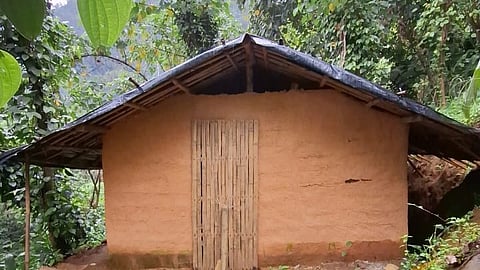Fear, unease and scent of death during monsoons
Neethu Chandran
The journey to Veerankudi started from the tea plantations of Malakkapara, accompanied by rainfall. From the higher vantage point, the Idamalayar Dam reservoir was visible. However, as we descended, the rain intensified. Like in most forest areas, the atmosphere carried the unmistakable scent of elephants. The colony residences had thriving turmeric and chili plants around.
Whenever the ominous dark clouds loom over the hills of Malakappara, a pervasive fear descends on Veerankudi residents. There is the constant threat that a rock may roll down from any direction.
Sipping her black tea, Viji recounts out the enduring tales of misery that have come to stay with the colony residents; "None of the houses in the colony provides safety; we live in constant fear when the rains descend,'' she laments. She and her husband Biju Kumar eke out a livelihood engaging in farming and gathering honey and millets from the forest.
Mud huts
At the onset of monsoon, the walls of their houses turn moist and damp. Viji and her husband live in the attic below Veeran's house. The rains ignite a sense of fear within them. The walls are marred by cracks, and the scene is no different in the adjacent house of her sister Kasithai.
"Whenever it rains, we all shift to the recently constructed attic out of fear of landslides," she says, pointing to a mud-and-bamboo hut, some short distance away. The bamboo mat door is secured with a wooden plank to prevent it from collapsing.
But Viji is resolute and asserts that regardless of the intensity of the rain or the volume of rocks tumbling down, they will not vacate their homes and move out to become refugees once more in the community hall in Malakappara.
Her determination is not rooted in a romanticized love for the forest, as the Muthuvan tribe has been residing in the forest for generations. Even the very few who have relocated to the countryside admit that there is no life outside the forest. They have unwavering faith in the forest.
It is only the persistent threat of recurring landslides that is the sole cause for concern, says Simil Gopi, ST Morcha Thrissur district president and resident of Arekap Colony, who accompanied as a guide.
Their adamant stand against returning to the camp, even if it means facing the fatal risk of landslides, stems from the deep-seated anguish caused by the persistent neglect of the authorities and governments who have consistently made only unkept promises, she adds.
Rain and landslides
In Veerankudi, landslides have become an unwelcome recurring feature for the past few years. It has been a customary annual pilgrimage for quite some time for officials from Malakappara to make it to Veerankudi during the two monsoon seasons. They go back to the community hall in Malakappara taking with them the colony residents after emphasizing the looming landslide risks, says Viji. The community hall lacks adequate facilities. Wild animals wreak havoc on the little turmeric and chilies are cultivated around the houses, says Veeran's eldest daughter Kasithai.
Their lives go on with fishing from Idamalayar reservoir and gathering honey and millets from the deep forest. Some of the youths are engaged in other capacities in Malakappara and in the nearby tea plantations. This is a region where political leaders are reluctant to visit even during election campaigns. Instead, they even summon the colony residents to Malakappara to seek their votes.
(Next: Deluge announcements and the red tape trap)
Part 2: Fear, unease and scent of death during monsoons


